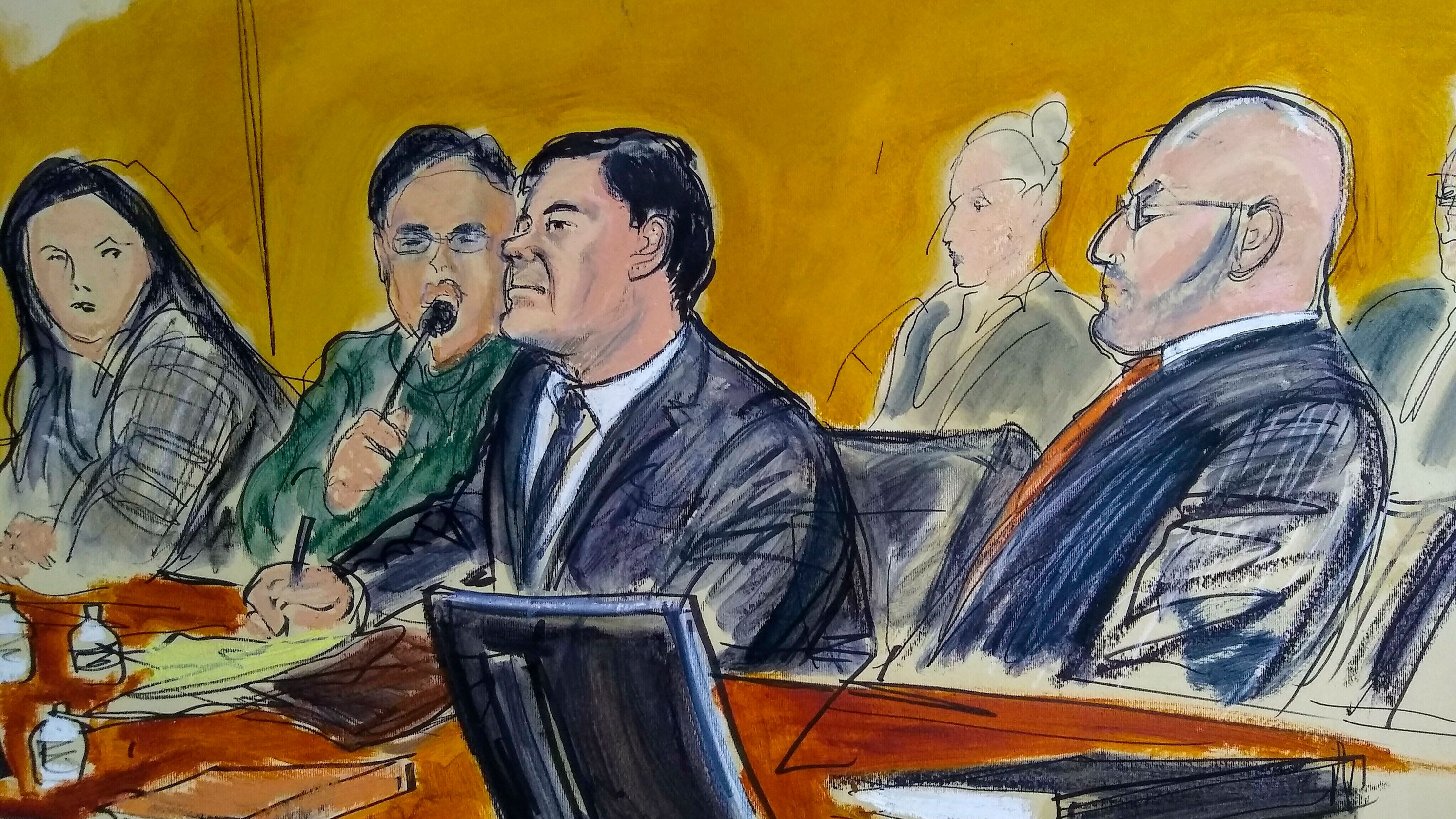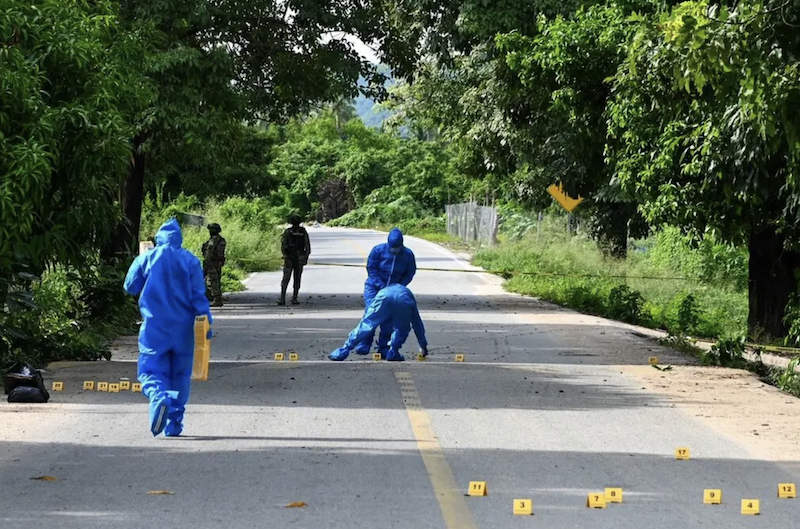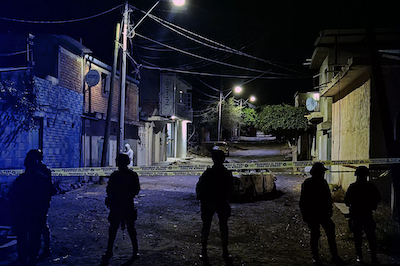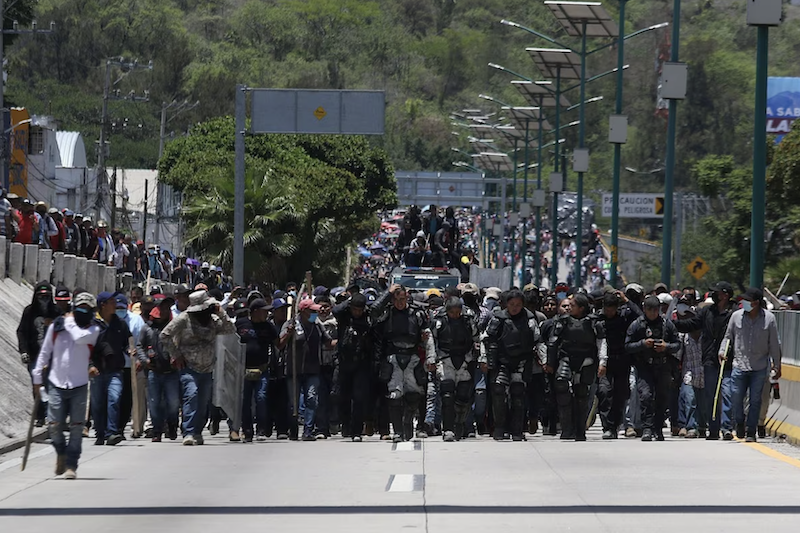
02/11/19 (written by aferrez) The evidentiary phase of the trial of Joaquin “El Chapo” Guzmán Loera, the purported leader the of the Sinaloa drug cartel, came to a conclusion on Wednesday, January 30, 2019 after having raised newfound speculation about the extent of the corruption in Mexico.
The trial included testimony from at least 16 of Guzmán’s “underlings and allies, some of whom served as cartel bag men.” Several of these witnesses are among those who made allegations of corruption about Mexican government officials, including members of the current and past Mexican presidential administrations.
According to Alan Feuer of The New York Times, “It is no secret that Mexico’s drug cartels have, for decades, corrupted the authorities with dirty money.” Nonetheless, the testimony of some witnesses brought several shocking allegations. For example, the testimony of Vicente Zambada, son of Ismael Zambada an alleged partner of Guzmán. On the witness stand, Zambada claimed his father had a bribery budget of one million dollars a month, and all of it went to high ranking government officials.
In addition to allegations brought forth by Zambada, another witness named Miguel Angel Martínez brought further allegations against Mexican authorities. According to Martínez’s testimony reported by again by Alan Feuer of The New York Times, the chief of Mexico City’s federal police, Guillermo González Calderoni, was the first official on Guzmán’s payroll in the late 1980s, and has since allegedly provided Guzmán with “secret information on an almost daily basis.” This information included, but was not limited to, the disclosure of a radar system installed on the Yucatán Peninsula by the United States government to track Guzmán’s drug flights from Columbia.
The testimony of such witnesses underscored the fact that major drug trafficking operations necessarily involve some significant level of government complicity. This was point was made especially clear by Juan Carlos Ramirez Abadía, a Columbian supplier of Guzmán, who was quoted by The New York Timesas stating that “It’s impossible to be the leader of a drug cartel in Columbia without having corruption…they go hand in hand.” Abadía testified that in order to traffic drugs internationally, his organization paid off everyone from journalists to tax officials.
As revealing as the trial has been with such examples, some experts think the revelations of corruption only scratch the surface. Feuer notes “the trial is offering a public airing of the crimes of the Sinaloa drug cartel –– but is only revealing ‘what the government would like us to hear.’” Indeed, Judge Brian M. Cogan, who presided over the case, had initially instructed some witnesses that they must refrain from discussing alleged corruption of government officials in Mexico because, “It would needlessly embarrass certain individuals and entities.” Nonetheless, the trial brought forth numerous specific details that suggested high level government involvement in the drug trade.
Perhaps the most shocking allegation of the trial was the claim that Guzmán directed a payment of $100 million dollar to then-sitting president Enrique Peña Nieto. Alex Cifuentes Villa, the Colombian drug lord who delivered the testimony against Peña Nieto, is recorded to have saidthat the Sinaloa cartel was initially contacted by Peña Nieto about the time he was elected president in late 2012, according toAlan Feuer at The New York Times. Feuer also notes that Cifuentes Villa testified that Enrique Peña Nieto asked Guzmán for $250 million in exchange for calling off a nationwide manhunt for himduring the campaign. Both Peña Nieto and the López Obrador government vehemently refuted the allegations brought against them and their administrations on social media and in public statements to the press.
In response to these allegations, the defense counsel representing Guzmán raised questions about the credibility of the witnesses for the prosecution. In a quote for an article produced by BBC News Mundo, lead defense attorney Jeffrey Lichtman asserted that those testifying against Guzmán are, for the most part, members of the Sinaloa cartel themselves and their testimony is likely intended to gain them leniency on sentences that they are currently serving. Lichtman believes the level of legitimacy of the witnesses is tainted by the fact that they are “men who have cheated all their lives.” Indeed, several witnesses who testified during the trial reportedly struck deals with the prosecution in an effort to receive reduced sentences or U.S. visas.
The final ruling on Guzmán’s fate remains in the hands of the jury, which at the time of this posting was still deliberating on a verdict. Regardless of the outcome, some analysts raised questions about whether there would be a reckoning for corrupt officials, given the details that were revealed at trial. In an interview with CBC Radio, Anabel Hernández, author of Narcoland: The Mexican Drug Lords and their Godfathers, stated, “The trial of El Chapo Guzmán is very symbolic…but the problem is that [it] will not resolve all the corruption, all the laundering of money that exists in Mexico, and that helps the Sinaloa Cartel, and also other cartels, to exist.”
Meanwhile, the trafficking of drugs to the United States continues unabated. Guzmán’s alleged partner, Ismael Zambada, remains at large and numerous other drug trafficking organizations continue to thrive in Mexico. Numerous sources reporting on the Guzmán trial note that this drug trafficking activity and the corruption that results is likely to continue as long as there is a voracious appetite for narcotics in the United States.
Sources:
Lissardy, Gerardo. “Juicio a ‘El Chapo’ Guzmán: La Batalla Clave De Los Testigos Comienza Con Relatos Épicos De Envíos De Cocaína, Dinero Sucio y Corrupción – BBC News Mundo.” BBC News, BBC, 15 Nov. 2018.https://www.bbc.com/mundo/noticias-america-latina-46217746
Feuer, Alan. “El Chapo Trial Shows That Mexico’s Corruption Is Even Worse Than You Think.” The New York Times, The New York Times, 28 Dec. 2018.https://www.nytimes.com/2018/12/28/nyregion/el-chapo-trial-mexico-corruption.html
Tremonti, Anna Maria. “The Current: Trial of El Chapo Won’t Resolve the Corruption That Empowered Him, Says Journalist | CBC Radio.” CBCnews, CBC/Radio Canada, 7 Jan. 2019.https://www.cbc.ca/radio/thecurrent/the-current-for-january-7-2019-1.4963706/trial-of-el-chapo-won-t-resolve-the-corruption-that-empowered-him-says-journalist-1.4968242
Feuer, Alan. “Former Mexican President Peña Nieto Took $100 Million Bribe, Witness at El Chapo Trial Says.” The New York Times, The New York Times, 15 Jan. 2019.
www.nytimes.com/2019/01/15/nyregion/el-chapo-trial.html.




